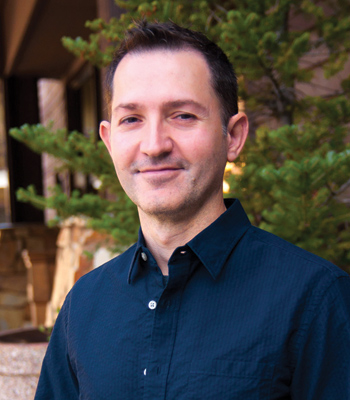Gürol Süel Wins Scialog Award
June 15, 2015
By Kim McDonald

Gürol Süel, an associate professor in the Section of Molecular Biology, has been awarded one of 13 grants given by The Gordon and Betty Moore Foundation and Research Corporation for Science Advancement to five teams of investigators as part of 2015 Scialog: Molecules Come to Life.
These grants, totaling $731,000, will enable the researchers to pursue ambitious, high-risk, highly impactful discovery research on untested ideas in physical cell biology. Each investigator will receive $56,250 and work in teams of two or three. Süel will be working with K.C. Huang of Stanford University on a research project focused on "Uncovering Essential Gene Functions by Exploiting Differentiation within a Biofilm."
The teams were formed at a Scialog conference called "Molecules Come to Life," held at Biosphere 2, north of Tucson, Arizona. Scialog (Science + Dialog) is a conference format developed by Research Corporation for Science Advancement to support intensive dialog, team building and an "on-the-spot" research competition for newly formed collaborations at the conference.
During the meeting, nearly 50 leading young scientists from divergent fields of biology and physical sciences engaged in intensive discussions designed to produce creative ideas. While at the meeting, these early-career researchers formed teams and worked through the night to draft a new, blue-sky, high-risk research proposal that addresses a pressing question underlying complex biological phenomena.
"This conference and resulting awards exemplify our high-risk, high-reward approach to tackling important scientific problems in basic research," said Moore Foundation program officer Gary Greenburg. "Through this endeavor, we are building a community of researchers that embrace the different approaches that biologists and physical scientists, theorists and experimentalists bring to bear on important biological questions, while extending our understanding of the physical biology of cells."
"Scialog aims to encourage collaborations between theorists and experimentalists," said RCSA program director Richard Wiener. "And, we encourage approaches that are driven by theory and coarse-grained modeling, that are testable by experiments. Our goal is nothing less than major scientific advances by the best and brightest early career researchers."
The five teams selected were recommended by an organizing committee of distinguished scientists, including four members of the National Academy of Sciences. The full list of awards is available here.
